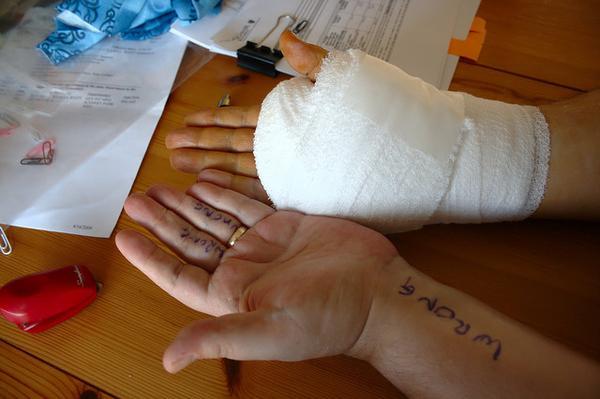Advertisement
True Transparency: Doctors Who Admit Errors, And How To Help Them

The topic is timely today because of a new Harvard study finding that most doctors will face a malpractice lawsuit at some point — and interesting work under way in Massachusetts to encourage medical apologies. The Patrick administration, too, supports making admissions and apologies easier. And the American Medical Association's amednews.com has just posted an inspiring piece on three doctors who came clean before their colleagues, including Mass. General's Dr. David C. Ring and Dr. Jo Shapiro of Brigham & Women's.
The piece begins with a heartbreaking story of a Seattle nurse whose dosage miscalculation led to a baby's death — and to her own suicide. (A recent study found that doctors have about double the usual suicide rate to begin with, and major medical mistakes triple their suicide risk, amednews reports.) And the piece ends with some of the efforts, in Boston and elsewhere, to help medical staffers who have made errors:
Supporting physicians when things go wrong
Few physicians talk publicly about their medical errors, but a growing number are benefiting from programs dedicated to helping doctors deal with the emotional turmoil that often comes in the wake of adverse events.
Jo Shapiro, MD, helped start the Center for Professionalism & Peer Support at Boston's Brigham and Women's Hospital in October 2008. There are 55 physicians and other health professionals at the hospital trained to offer emotional support to peers involved in cases of patient harm.
"When there's any kind of adverse event that we hear about, one of us will make an outreach call to the physician involved," Dr. Shapiro says. "We ask them simple questions like, 'How are you doing? How are you feeling? Is there anything I can do to help you?' "
Also:
Other health care organizations such as Children's Hospital Boston, Johns Hopkins Hospital in Baltimore, the University of Illinois Medical Center in Chicago and the University of Missouri Health System have peer support programs, says Linda K. Kenney, president and executive director of Medically Induced Trauma Support Services in Chestnut Hill, Mass.
Kenney, who was nearly killed by a medical error in November 1999, now advises hospitals on how to disclose adverse events and support the patients, families, physicians and other health professionals involved. Nearly 400 people have requested her organization's tool kit on setting up peer support systems.
This program aired on August 18, 2011. The audio for this program is not available.
